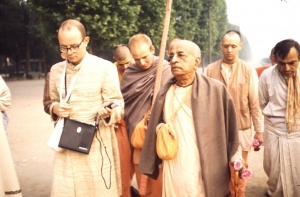BG 11.44: Difference between revisions
m (1 revision(s)) |
(Vanibot #0020 edit - link to the Version Compare feature) |
||
| Line 1: | Line 1: | ||
{{ | [[Category:Bhagavad-gita As It Is (1983+) - Chapter 11]] | ||
<div style="float:left">'''[[Bhagavad-gita As It Is (1983+)]] - [[BG 11 (1983+)|Chapter 11: The Universal Form]]'''</div> | |||
<div style="float:right">[[File:Go-previous.png|link=BG 11.43]] '''[[BG 11.43]] - [[BG 11.45]]''' [[File:Go-next.png|link=BG 11.45]]</div> | |||
{{CompareVersions|BG|11.44|BG 1972|BG 1983+}} | |||
{{RandomImage}} | |||
==== TEXT 44 ==== | ==== TEXT 44 ==== | ||
<div class="devanagari"> | |||
:तस्मात्प्रणम्य प्रणिधाय कायं | |||
:प्रसादये त्वामहमीशमीड्यम् । | |||
:पितेव पुत्रस्य सखेव सख्युः | |||
:प्रियः प्रियायार्हसि देव सोढुम् ॥४४॥ | |||
</div> | |||
<div | <div class="verse"> | ||
:tasmāt praṇamya praṇidhāya kāyaṁ | |||
:prasādaye tvām aham īśam īḍyam | |||
:piteva putrasya sakheva sakhyuḥ | |||
:priyaḥ priyāyārhasi deva soḍhum | |||
</div> | </div> | ||
==== SYNONYMS ==== | ==== SYNONYMS ==== | ||
<div class="synonyms"> | |||
<div | ''tasmāt''—therefore; ''praṇamya''—offering obeisances; ''praṇidhāya''—laying down; ''kāyam''—the body; ''prasādaye''—to beg mercy; ''tvām''—unto You; ''aham''—I; ''īśam''—unto the Supreme Lord; ''īḍyam''—worshipable; ''pitā iva''—like a father; ''putrasya''—with a son; ''sakhā iva''—like a friend; ''sakhyuḥ''—with a friend; ''priyaḥ''—a lover; ''priyāyāḥ''—with the dearmost; ''arhasi''—You should; ''deva''—my Lord; ''soḍhum''—tolerate. | ||
</div> | </div> | ||
==== TRANSLATION ==== | ==== TRANSLATION ==== | ||
<div class="translation"> | |||
<div | |||
You are the Supreme Lord, to be worshiped by every living being. Thus I fall down to offer You my respectful obeisances and ask Your mercy. As a father tolerates the impudence of his son, a friend the impertinence of a friend, or a husband the familiarity of his wife, please tolerate the wrongs I may have done You. | You are the Supreme Lord, to be worshiped by every living being. Thus I fall down to offer You my respectful obeisances and ask Your mercy. As a father tolerates the impudence of his son, a friend the impertinence of a friend, or a husband the familiarity of his wife, please tolerate the wrongs I may have done You. | ||
</div> | </div> | ||
==== PURPORT ==== | |||
= | <div class="purport"> | ||
Kṛṣṇa's devotees relate to Kṛṣṇa in various relationships; one might treat Kṛṣṇa as a son, or one might treat Kṛṣṇa as a husband, as a friend, or as a master. Kṛṣṇa and Arjuna are related in friendship. As the father tolerates, or the husband or a master tolerates, so Kṛṣṇa tolerates. | |||
</div> | |||
<div | <div style="float:right; clear:both;">[[File:Go-previous.png|link=BG 11.43]] '''[[BG 11.43]] - [[BG 11.45]]''' [[File:Go-next.png|link=BG 11.45]]</div> | ||
__NOTOC__ | |||
</div> | __NOEDITSECTION__ | ||
__NOTOC__ | |||
Revision as of 19:25, 7 December 2017

A.C. Bhaktivedanta Swami Prabhupada
TEXT 44
- तस्मात्प्रणम्य प्रणिधाय कायं
- प्रसादये त्वामहमीशमीड्यम् ।
- पितेव पुत्रस्य सखेव सख्युः
- प्रियः प्रियायार्हसि देव सोढुम् ॥४४॥
- tasmāt praṇamya praṇidhāya kāyaṁ
- prasādaye tvām aham īśam īḍyam
- piteva putrasya sakheva sakhyuḥ
- priyaḥ priyāyārhasi deva soḍhum
SYNONYMS
tasmāt—therefore; praṇamya—offering obeisances; praṇidhāya—laying down; kāyam—the body; prasādaye—to beg mercy; tvām—unto You; aham—I; īśam—unto the Supreme Lord; īḍyam—worshipable; pitā iva—like a father; putrasya—with a son; sakhā iva—like a friend; sakhyuḥ—with a friend; priyaḥ—a lover; priyāyāḥ—with the dearmost; arhasi—You should; deva—my Lord; soḍhum—tolerate.
TRANSLATION
You are the Supreme Lord, to be worshiped by every living being. Thus I fall down to offer You my respectful obeisances and ask Your mercy. As a father tolerates the impudence of his son, a friend the impertinence of a friend, or a husband the familiarity of his wife, please tolerate the wrongs I may have done You.
PURPORT
Kṛṣṇa's devotees relate to Kṛṣṇa in various relationships; one might treat Kṛṣṇa as a son, or one might treat Kṛṣṇa as a husband, as a friend, or as a master. Kṛṣṇa and Arjuna are related in friendship. As the father tolerates, or the husband or a master tolerates, so Kṛṣṇa tolerates.